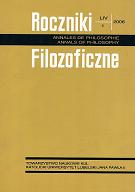Związek metafizyki i epistemologii w myśli W. S. Sołowjowa
The Connection between Metaphysics and Epistemology in V. S. Soloviov's Thought
Author(s): Teresa ObolevitchSubject(s): Philosophy
Published by: Towarzystwo Naukowe KUL & Katolicki Uniwersytet Lubelski Jana Pawła II
Keywords: Soloviov; metaphysics; epistemology; all-unity; Absolute
Summary/Abstract: In the article the assumptions are analyzed of V. S. Soloviov’s (1853-1900) metaphysics presented in his Criticism of Abstract Principles. When forming a metaphysics Soloviov considers and subjects to criticism two theories: Hegel’s extreme (in the Russian philosopher’s term – “abstract”) idealism, and the positivists’ radical empiricism. Soloviov perceives resolution of the difficulties seen in these theories in the conception of the so-called all-unity. According to this conception every being has its ontic foundation in the Absolute, which makes possible an inner connection between all things on the metaphysical and, respectively, epistemological level. In the present study it was found that Soloviov’s metaphysics is based on the following assumptions: (1) the thesis about the possibility of cognizing ‘a thing in itself’; (2) determining a close connection that occurs between the ontological and epistemological order; (3) the conviction that analysis of epistemological conception leads to the ontological ‘truth about the thing’. Acceptance of these propositions is connected with the Russian philosopher’s religious beliefs concerning the existence of an ultimate foundation of reality, and his detailed critical-historical analyses are completely subjected to the aspiration to create a theist metaphysics on the basis of this Absolute principle, that is of God.
Journal: Roczniki Filozoficzne
- Issue Year: 54/2006
- Issue No: 1
- Page Range: 107-124
- Page Count: 18
- Language: Polish

